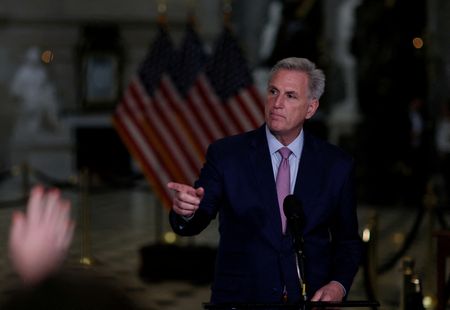By David Morgan and Katharine Jackson
WASHINGTON (Reuters) – Republicans who control the U.S. House of Representatives face an uphill battle this week passing their first two fiscal 2024 spending bills, with hardline demands for lower spending levels threatening to divide Speaker Kevin McCarthy’s narrow majority.
Republican hopes of gaining the upper hand against the Democratic-led Senate over U.S. government spending for the next fiscal year will face their first test on Wednesday afternoon, with a procedural vote on a military construction and veterans affairs appropriations bill that conservative lawmakers say should be popular enough to pass in a party line vote.
But a second appropriations bill to fund agriculture programs, rural development initiatives and the Food and Drug Administration for fiscal 2024, which begins Oct. 1, could have trouble making it to the chamber floor for a vote amid hardliners’ spending concerns.
“It’s not looking real good on that right now,” said Representative Kevin Hern, who chairs the conservative Republican Study Committee.
McCarthy and other Republican leaders see progress on the appropriations front as a key lever against the Democratic-led Senate in a showdown over spending that could trigger a partial government shutdown when current funding expires on Sept. 30.
Members of the ultra-conservative House Freedom Caucus, who want next year’s spending at the $1.47 trillion level seen in fiscal 2022, put party leaders on notice this week that they reject efforts to use previously appropriated funds to move spending closer to the $1.59 trillion agreed by McCarthy and Democratic President Joe Biden in June.
Biden on Monday vowed to veto the Republican spending bills if they make it to his desk, saying they backed away from the deal. Both the House and the Senate would have to agree to any final legislation before sending it to the president.
Republican leaders had sought to shift $115 billion from existing Democratic programs to Republican priorities in fiscal 2024 to compensate for the cuts sought by Freedom Caucus members. But hardliners want that money used instead to pay down the nation’s more than $31.4 trillion debt.
Wednesday’s military and veterans bill would provide $155.7 billion in discretionary spending for military construction and veterans affairs. The health and agriculture bill would provide $25.3 billion, but that includes about $7.5 billion moved from Democratic programs.
House Majority Leader Steve Scalise said party leaders were still negotiating with hardliners, telling reporters: “That’s something we’re meeting with them on throughout the day.”
But Republican leaders risk losing support from other conservatives.
“Let’s pass the bill as it is,” said Representative Don Bacon, a Republican centrist from Nebraska.
“If these guys keep pushing for more cuts, it may be in jeopardy.”
(Reporting by David Morgan and Katharine Jackson in Washington; editing by Susan Heavey)







